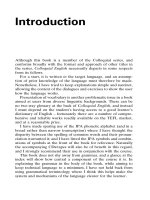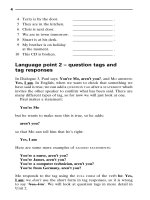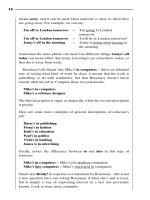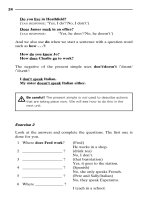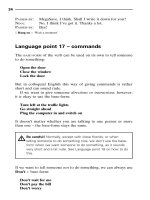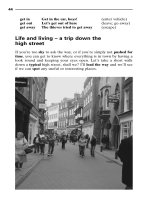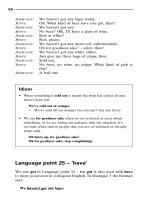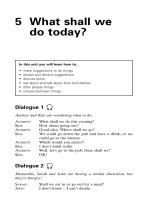Tài liệu A complete English language course part 10 doc
Bạn đang xem bản rút gọn của tài liệu. Xem và tải ngay bản đầy đủ của tài liệu tại đây (392.31 KB, 10 trang )
Language point 33 – liking doing things
As well as talking about liking things, you can also talk about liking
doing things. Look at these two sentences:
Sue likes ice cream
on a hot day
Sue likes sitting under the trees
on a hot day
When we talk about liking doing things, like is followed by the ing-
form of the verb. Here are some more examples:
(swim) The children like swimming
in the pool
(read) Does your sister like reading
magazines?
(play) Terry likes playing
tennis on his days off
(watch) I don’t like watching
football on TV
(sit) I like sitting
in the garden
(work) Do you like working
for the company?
And when someone asks you if you like something, there are many
answers you can give. Let’s look as some of the possibilities, starting
with positive answers and going through to negative answers:
Do you like fast food
? Yes, I love it!
Yes, I quite like it
It’s OK, I suppose
I’m not bothered
Not really
No, I don’t like it at all
I can’t stand it!
No, I hate it!
Exercise 8
Fill in the blanks with the verbs in the box – use the different forms
of the verbs to help you decide which ones belong where. The first
one is done for you.
1 Would you like to help me with the washing-up?
2 Do you like ____ football?
3 ____ Jerry like ____ on the beach?
4 ____ you like to ____in this evening?
5 I like ____ my exercises in the morning.
74
6 Fiona ____ ____ with the washing-up.
7 Would you ____ to ____ cricket with us today?
8 I ____ like ____in the evening.
9 Would you like to ____ some aerobics at the health club this
evening?
10 ____ you like ____ to the radio?
helping sunbathing doing play
help
playing listening do
don’t does would do
likes like working stay
Exercise 9
Look at the answers to the question ‘Do you like fast food?’ at the
end of Language point 33 – can you draw two lines to divide the
answers into positive, neutral and negative?
Language point 34 – choosing between
two things, and pointing them out
You can use the verb prefer to say which of two things or actions
you think is better:
Which would you prefer – tea or coffee?
I’d prefer coffee, thank you.
We use prefer when we think something is better than something
else:
I prefer coffee = ‘I think coffee is better’
I prefer coffee to tea = ‘I think coffee is better than tea’
We use (woul)d prefer when we want something more than some-
thing else:
I’d prefer coffee = ‘It would be better if you gave
me coffee.’
Would you prefer tea? = ‘Would it be better if I gave you
tea?’
1111
2
3
4
5
6
7
8
9
10
11
1211
13
14
15
16
17
18
19
20
21
22
23
24
25
26
27
28
29
30
31
32
33
34
35
36
37
38
39
40
41
4211
75
Now look at these examples:
Do you like this hat or that one?
I like them both, but I prefer that one.
Notice that we put this in front of a noun when we want to talk
about something that is near to the speaker, and that for something
that is further away. So, if Anne is holding a red hat and Susan is
holding a blue hat, Anne says this hat for the red one and that hat
for the blue one. For Susan it’s the other way round!
Now look at these examples:
Which tie do you prefer? – I like this one
Which trousers do you prefer? – I like these
Which hat do you prefer? – I like that one
Which shoes do you prefer? – I like those
If the noun has already been mentioned, you don’t need to repeat
it – you can use this/that and these/those without the noun, but you
have to put one after this and that.
Exercise 10
Can you match each sentence on the left to one on the right that
means the same thing? The first one has been done for you.
1 I prefer coffee a Please give me some coffee
2 I wouldn’t like coffee b I think coffee is nice
3 I’d like coffee c Please give me some coffee
instead
4 I don’t like coffee d I think coffee is better
5 I’d prefer coffee e Don’t give me any coffee
6 I like coffee f I don’t think coffee is nice
76
Be careful! When the noun is plural, this changes to these
and that changes to those:
Singular Plural
this hat these hats
that hat those hats
ƽ
Exercise 11
Choose the right word in brackets to complete each sentence. The
first one has been done for you.
1 How much are (that
/those) apples?
2 Do you like (these/this) watch?
3 (Those/That) people are from Bangladesh.
4 I think (this/these) are too expensive.
5 Would you like some more of (this/these) cake?
6 I like (this/these) jumper, but I prefer (that/those) one.
7 Shall we sit at (this/those) table?
8 (This/those) children are very noisy, aren’t they?
9 How much are (this/these)?
10 Would you prefer (this/those) restaurant or (those/that)
one?
Dialogue 7
It’s a lovely day, and Brian and Susan are wondering where to go
for lunch. Pay attention to the tags in this conversation.
S
USAN
: You like seafood, don’t you?
B
RIAN
: Yes, I love it!
S
USAN
: Well, why don’t we go down to the beach and have
lunch there?
B
RIAN
: OK, let’s do that. Shall we ask Fiona if she’d like to
come too?
S
USAN
: No – Fiona doesn’t like the beach, does she?
B
RIAN
: Ah – no, you’re right. She doesn’t. Perhaps James
would like to come with us?
S
USAN
: Maybe. How about phoning him to ask?
B
RIAN
: Wait a minute. Let’s decide which restaurant to go to
first, shall we?
S
USAN
: I like the Jolly Roger – the food’s excellent.
B
RIAN
: Hmm, yes . . . but I don’t like their prices! How about
trying that new restaurant, further up the road.
S
USAN
: You mean the Ocean View? They specialise in shell-
fish, don’t they?
B
RIAN
: Yes. I’d really like to give it a try, wouldn’t you?
S
USAN
: OK, let’s go there. Shall we phone first to book a
table?
1111
2
3
4
5
6
7
8
9
10
11
1211
13
14
15
16
17
18
19
20
21
22
23
24
25
26
27
28
29
30
31
32
33
34
35
36
37
38
39
40
41
4211
77
B
RIAN
: That would be a good idea, wouldn’t it? It’s very popular
at lunchtimes.
S
USAN
: Right – why don’t you phone James, and then I’ll phone
the Ocean View.
Exercise 12
Read Dialogue 4 again, and then decide whether the following
statements are True (T) or False (F).
1 Fiona wouldn’t like to come to the beach T / F
2 The Ocean View doesn’t do shellfish T / F
3 Brian doesn’t like seafood very much T / F
4 Brian doesn’t like the food at the Jolly Roger T / F
5 Susan is going to phone James T / F
6 Lots of people have lunch at the Ocean View T / F
Phrasal verbs
come along – ‘accompany’; ‘come with (other people)’. Do you want to
come along? means ‘We’re going somewhere – do you want to come
with us?’.
eat in – ‘have food at home’.
eat out – ‘have food in a restaurant, or anywhere away from home’.
end up – when we end up at a place, it means that we have visited several
places, and this is the last one. We ended up in the curry house could
mean, for example, that we went to the cinema, then to the pub, and
finally to the curry house.
meet up – ‘meet by arrangement’. We met Keith, Greg and Carl usually
means that we met them by chance – we weren’t expecting to see them;
We met up with Keith, Greg and Carl means that we had arranged or
agreed to meet them.
try out – when we try something out, we test it to see if it’s okay, or if we
like it.
78
Idiom
• give it a try means ‘try it out’ or ‘see what it’s like’

